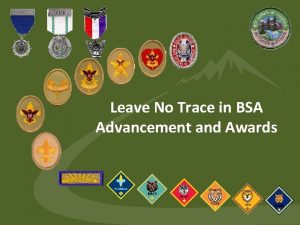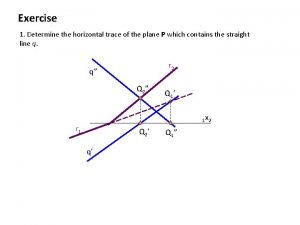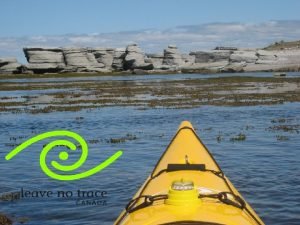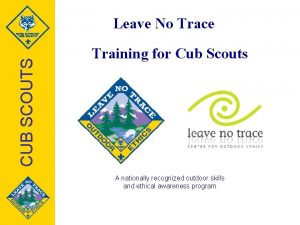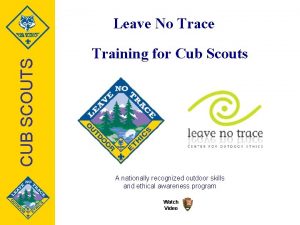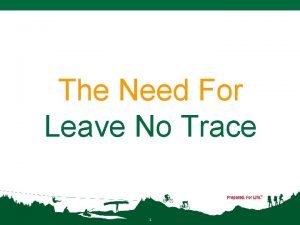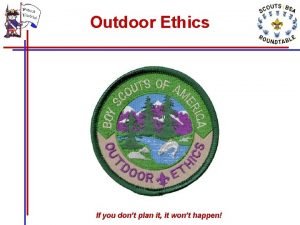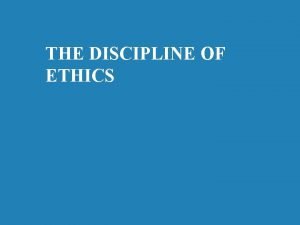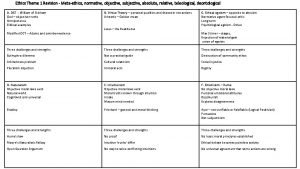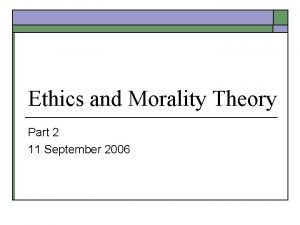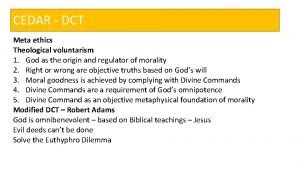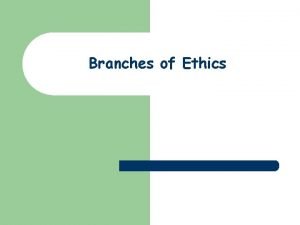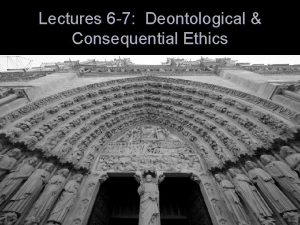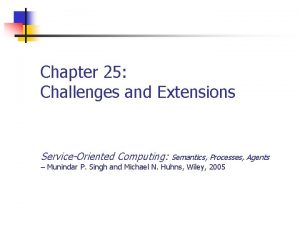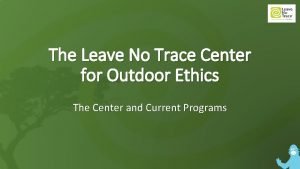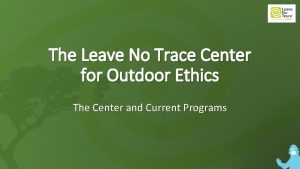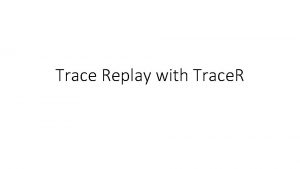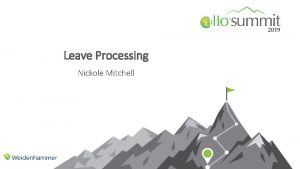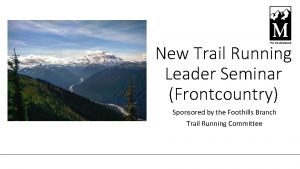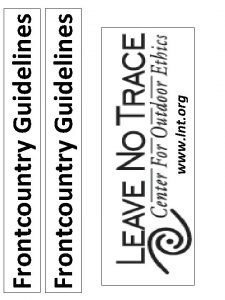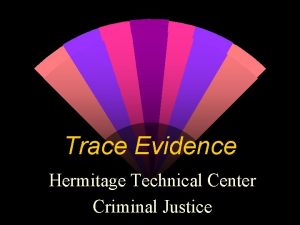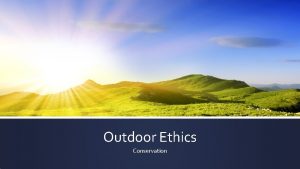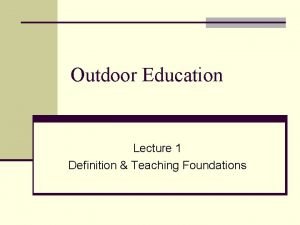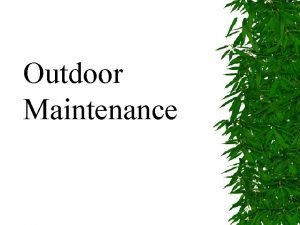Leave No Trace Center for Outdoor Ethics Frontcountry



















- Slides: 19

Leave No Trace Center for Outdoor Ethics Frontcountry Program

What is Frontcountry? n Frontcountry is defined as outdoor areas that are easily accessible by vehicle and mostly visited by day users.

Why do we need a Leave No Trace Frontcountry Program? n n Vast majority (over 85%) of recreation in the U. S. occurs near urban centers – day hiking, bird watching, dog walking, jogging, bouldering, picnicing, overnight camping in developed camping areas, water sports, fishing, etc. Need an effective way to reach this large population with the Leave No Trace message

Why do we need a Leave No Trace Frontcountry Program? n n There are specific recreational impacts that are unique to frontcountry areas that need to be effectively targeted – user/social conflict, pet management issues, graffiti and vandalism, pet waste, private property trespass, off-trail hiking, etc. Land managers and others need the ability to locally-tailor specific Leave No Trace messages to more effectively reach frontcountry audiences

Impacts and issues found in Frontcountry areas Severely eroded areas/trails Dealing with multi-use Compacted Soil Pet Waste Trashed firerings in developed areas Trash (motor oil) left at day-use areas Wildlife impacts in day-use areas Illegally constructed mountain bike trails/structures

Impacts and issues found in Frontcountry areas Severely eroded areas/trails Dealing with multi-use Trashed firerings in developed areas Trash (motor oil) left at day-use areas

National Participant Growth Projections (millions)

Approved Frontcountry Leave No Trace language n n n n Plan Ahead & Prepare Travel & Camp on Durable Surfaces Dispose of Waste Properly Leave What You Find Minimize Campfire Impacts Respect Wildlife Be Considerate of Other Visitors n n n n Know Before You Go Stick to Trails Trash Your Trash, Pick Up Poop (dog waste) Leave It As You Find It Be Careful With Fire Keep Wildlife Wild Share Our Trails, Yield to Others

Examples of modified language and graphics

Stick to Trails n Traveling on trail leaves room for wildlife and their homes. Short cutting trails cause erosion. Be ready to get muddy and step right through puddles. Boots dry overnight; plants take years to recover.

Protect Our Waters n Riparian areas are vital to the health and diversity of animal and plant life in the Basin. These areas are often the sole habitat for many plants and animals species that need wet conditions.

Manage Your Dog n Keeping your dog in control keeps people, dogs, livestock and wildlife safe. Others may not appreciate your dogs company, therefore ask before allowing your dog to approach them. Keep your dog nearby and under control. Carry and use a leash as required.

Respect Private Property n Respect “no trespassing” signs. If property boundaries are unclear, do not disturb the area. Treat another’s property as you would treat you own.

Pick Up Poop n Phew! Dog poop stinks, is not natural to Open Space and others can step in it. Pack a pick-up bag and always pick-up your dog’s poop--wherever its left.

Climb Smart n Red Rock Canyon Conservation Area is a world famous rock climbing destination that offers something for every climber. To preserve this precious and sensitive resource, please climb responsibly.

Keep Wildlife Wild n Natural areas are home to wildlife. As a visitor, you should respect wildlife by observing them from a distance and not feeding them.

Trash Your Trash n Please take out all trash, yours and others. Even “biodegradable” materials such as orange peels, apple cores and food scraps can take years to break down, and attract scavengers that harm other wildlife.

Leave It as You Find It n Picking flowers, collecting rocks or taking arrowheads may not seem to be a big deal, but it means others won’t have a chance to enjoy them. With millions of people visiting Open Space, the less impact we each make, the longer we will enjoy what we have.

Share Our Trails n We all enjoy Open Space in different ways. Pay attention, expect to encounter others and be courteous. Yield to all.
 National outdoor award requirements
National outdoor award requirements Vertical trace and horizontal trace
Vertical trace and horizontal trace Leave no trace canada
Leave no trace canada Bsa leave no trace
Bsa leave no trace Bsa outdoor ethics
Bsa outdoor ethics Cub scout leave no trace pledge
Cub scout leave no trace pledge Boy scouts leave no trace
Boy scouts leave no trace Leave no trace principles cub scouts
Leave no trace principles cub scouts Outdoor ethics awareness award
Outdoor ethics awareness award Descriptive ethics vs normative ethics
Descriptive ethics vs normative ethics Normative ethical questions
Normative ethical questions Micro and macro ethics
Micro and macro ethics Factual inquiry in ethics
Factual inquiry in ethics Metaethics vs normative ethics
Metaethics vs normative ethics Descriptive ethics vs normative ethics
Descriptive ethics vs normative ethics Beneficence examples
Beneficence examples Metaethics vs normative ethics
Metaethics vs normative ethics L
L What is deontological ethics
What is deontological ethics Teleological ethics vs deontological ethics
Teleological ethics vs deontological ethics
